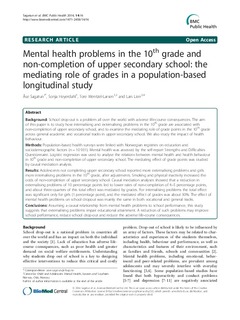| dc.contributor.author | Sagatun, Åse | |
| dc.contributor.author | Heyerdahl, Sonja | |
| dc.contributor.author | Wentzel-Larsen, Tore | |
| dc.contributor.author | Lien, Lars | |
| dc.date.accessioned | 2014-01-31T11:36:57Z | |
| dc.date.available | 2014-01-31T11:36:57Z | |
| dc.date.issued | 2014 | |
| dc.identifier.citation | Sagatun, Å., Heyerdahl, S., Wentzel-Larsen, T. & Lien, L. (2014). Mental health problems in the 10th grade and non-completion of upper secondary school: the mediating role of grades in a population-based longitudinal study. BMC Public Health, 14(16). | no_NO |
| dc.identifier.uri | http://hdl.handle.net/11250/134642 | |
| dc.description | Vitenskapelig, fagfellevurdert artikkel | no_NO |
| dc.description.abstract | Background: School drop-out is a problem all over the world with adverse life-course consequences. The aim
of this paper is to study how internalising and externalising problems in the 10th grade are associated with
non-completion of upper secondary school, and to examine the mediating role of grade points in the 10th grade
across general academic and vocational tracks in upper secondary school. We also study the impact of health
behaviour.
Methods: Population-based health surveys were linked with Norwegian registries on education and
sociodemographic factors (n = 10 931). Mental health was assessed by the self-report Strengths and Difficulties
Questionnaire. Logistic regression was used to analyse the relations between mental health and health behaviour
in 10th grade and non-completion of upper secondary school. The mediating effect of grade points was studied
by causal mediation analysis.
Results: Adolescents not completing upper secondary school reported more externalising problems and girls
more internalising problems in the 10th grade, after adjustments. Smoking and physical inactivity increased the
odds of non-completion of upper secondary school. Causal mediation analyses showed that a reduction in
externalising problems of 10 percentage points led to lower rates of non-completion of 4–5 percentage points,
and about three-quarters of this total effect was mediated by grades. For internalising problems the total effect
was significant only for girls (1 percentage point), and the mediated effect of grades was about 30%. The effect of
mental health problems on school dropout was mainly the same in both vocational and general tracks.
Conclusions: Assuming a causal relationship from mental health problems to school performance, this study
suggests that externalising problems impair educational attainment. A reduction of such problems may improve
school performance, reduce school drop-out and reduce the adverse life-course consequences. | no_NO |
| dc.language.iso | eng | no_NO |
| dc.publisher | BioMed Central | no_NO |
| dc.relation.uri | http://www.biomedcentral.com/bmcpublichealth/ | |
| dc.relation.uri | http://www.biomedcentral.com/ | |
| dc.subject | school drop-out | no_NO |
| dc.subject | health behaviour | no_NO |
| dc.subject | adolescents | no_NO |
| dc.subject | mental health | no_NO |
| dc.subject | externalising problems | no_NO |
| dc.subject | internalising problems | no_NO |
| dc.subject | school performance | no_NO |
| dc.subject | educational attainment | no_NO |
| dc.subject.mesh | Adolescent Behavior | |
| dc.subject.mesh | Educational Measurement | |
| dc.subject.mesh | Educational Status | |
| dc.subject.mesh | Health Behavior | |
| dc.subject.mesh | Health Surveys | |
| dc.subject.mesh | Longitudinal Studies | |
| dc.subject.mesh | Mental Disorders | |
| dc.subject.mesh | Mental Health | |
| dc.subject.mesh | Norway | |
| dc.subject.mesh | Questionnaires | |
| dc.subject.mesh | Schools | |
| dc.subject.mesh | Sex Factors | |
| dc.subject.mesh | Socioeconomic Factors | |
| dc.title | Mental health problems in the 10th grade and non-completion of upper secondary school: the mediating role of grades in a population-based longitudinal study | no_NO |
| dc.type | Journal article | no_NO |
| dc.type | Peer reviewed | no_NO |
| dc.subject.nsi | VDP::Medical disciplines: 700::Health sciences: 800 | no_NO |
| dc.source.volume | 14 | no_NO |
| dc.source.journal | BMC Public Health | no_NO |
| dc.source.issue | 16 | no_NO |
| dc.identifier.doi | 10.1186/1471-2458-14-16 | |
